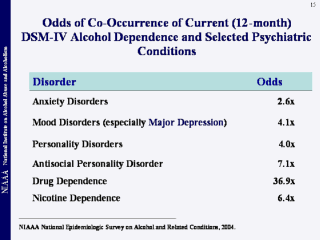Search for most updated materials ↑
| front |1 |2 |3 |4 |5 |6 |7 |8 |9 |10 |11 |12 |13 |14 |15 |16 |17 |18 |19 |20 |21 |22 |23 |24 |25 |26 |27 |28 |29 |30 |31 |32 |33 |34 |35 |36 |37 |38 |39 |40 |41 |42 |review |
 |
In addition to the many adverse
health effects that result directly from alcohol misuse, co-morbid
conditions often present further complications for individuals with
alcohol abuse problems. Alcohol abuse and dependence commonly occur
in individuals who suffer from mood, anxiety, and personality
disorders as well as the effects of other drugs of abuse. For
example, an estimated 90% of cocaine addicts have alcohol problems.
It also has been estimated that as many as 60% of patients
presenting at community mental health centers have co-morbid alcohol
and other drug abuse disorders. Patients suffering from both
disorders often have poorer treatment outcomes and are more likely
to drop out of treatment. Unfortunately, effective pharmacological
and behavioral treatments have yet to be established for the various
conditions of co-morbid alcohol and other drug abuse disorders.
The high co-morbidity between alcohol
and tobacco dependence poses special problems. Fifty to ninety
percent of alcoholics smoke, a rate that is three times higher than
among the population as a whole. Alcoholics smoke heavily, are more
addicted to nicotine and are less successful at quitting smoking,
which puts them at a greater risk for the synergistic effects of
alcohol and nicotine on the development of certain cancers and
cardiovascular diseases.
|